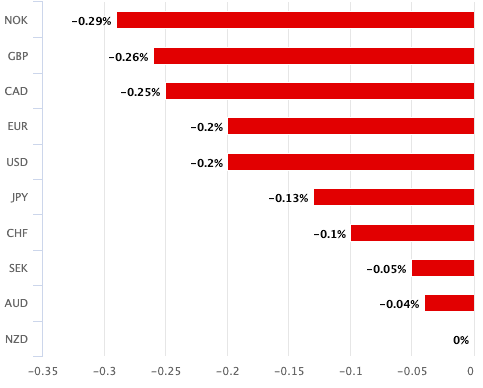
The New Zealand Dollar is the biggest G10 loser ahead of the weekend.
The New Zealand Dollar lost value to all its major peers on Friday (see chart above), with a new business survey showing a deterioration in sentiment.
ANZ Roy Morgan Consumer Confidence fell 4 points in October to 91.2, following three months of improvement.
The decline in sentiment came in the same month that the RBNZ cut interest rates by 50 basis points, suggesting there was more work to be done by the central bank if sentiment was to make a concerted turn for the better.
"Falling interest rates had spurred a cautious recovery in consumer confidence from July, but October marked a sombre return to reality," says Sharon Zollner, chief economist at ANZ, commenting on the consumer confidence report.
The Pound to New Zealand Dollar exchange rate is up 0.65% this week at 2.1628, and the Euro to New Zealand Dollar is up 0.77% at 1.8036. Against the U.S. Dollar, the Kiwi is another 0.60% lower at 0.60.
The Kiwi's losses are also consistent with the broader antipodean underperformance, with its closest neighbour also underperforming.
Both the Australian and New Zealand Dollar appear weighed down by subdued investor sentiment coming out of Asia, amidst disappointment regarding Chinese efforts to stimulate the economy.
"The Antipodeans FX have underperformed overnight, with NZD/USD posting fresh two-month lows under 0.60, and AUD/USD being close to its two-month low. A rather downbeat mood surrounding China’s outlook may continue to weigh, as the PBoC refrained from lowering further some of its interest rates today," says Alexandre Dolci, FX Strategist at Crédit Agricole.
October has been a difficult month for NZD as the currency has proven particularly vulnerable to the rise in U.S. bond yields that have followed improving economic activity in the world's biggest economy.
This speaks to the Kiwi's sensitivity to global investor sentiment.
We had seen the currency catch a bid in September as investors saw Chinese authorities take steps to stimulate their economy.
However, the sugar rush of these measures soon faded, leaving NZD at the whims of rising U.S. yields and the big Dollar.
Expect the Dollar to remain supported through the next week, with investor nerves heightened ahead of Friday's U.S. job report and the U.S. election the following week.
Strong data will bolster the Dollar, and it looks as though New Zealand's Dollar is most vulnerable to this strength.
Betting markets meanwhile point to Donald Trump winning the U.S. election, which heralds higher import tariffs and a further retreat in globalism.
For a small, open economy such as New Zealand, this is a definite headwind.
